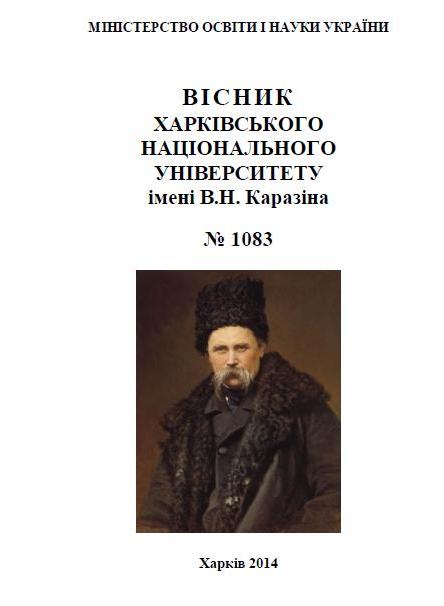СВОБОДА ЯК ЧИННИК НАРАТИВНОЇ ІДЕНТИЧНОСТІ ТА АВТЕНТИЧНОСТІ ОСОБИСТОСТІ
Abstract
Проаналізовано традицію вживання поняття «наратив» у науковому дискурсі, доведено
можливість його аплікації на дослідження соціальної реальності. Досліджується сутність
свободи як чинника соціальних ідентичностей. Основна увага зосереджена на характеристиці
наративу як засобу ідентифікації особи. Зазначається, що особистісна та соціальна
ідентичність є однією з найактуальніших і важливих проблем сучасної філософської
антропології.
Ключові слова: свобода, національна ідентичність, національна свідомість, наратив,
наративна ідентичність особистості.
Постановка проблеми у загальному
Савицкая И. Н. Свобода как фактор нарративной идентичности и аутентичности
личности. Проанализирована традиция употребления понятия «нарратив» в научном дискурсе,
доказана возможность его аппликации на исследование социальной реальности. Исследуется
сущность свободы как фактора социальных идентичностей. Основное внимание сосредоточено
на характеристике нарратива как средстве идентификации. Подчеркивается, что личная и
социальная идентичность является одной из наиболее актуальных и важных проблем
современной философской антропологии.
Ключевые слова: свобода, национальная идентичность, национальное сознание, нарратив,
нарративная идентичность личности.
Savitska I.M.. Freedom as a factor of narrative identity and authenticity of personality. The
article explores the phenomenon of freedom as factor of narrative identity and authenticity of
thepersonality. Personal and social identity is one of the most actual and important problems of
contemporary philosophy and anthropology. The main attention is focused on the characteristics of a
narrative as a means of identification. Analyzed the tradition use of «narrative» in scientific discourse,
proved the feasibility of its application to the study of social reality. We investigate the nature of social
identities. It was found that narrative serves the mechanism of organizing experience of the human
person, which ensures the unity of life itself. The narrative concept of self and otherness implies that one
is able to take responsibility for their actions and experience, and is able to bring to justice the other, to
put the question to them. The article is decated to the narrativ dimention of problem of the Self and
Otherness. The analysis of philosophical-anthropological maintenance of category of “self” is carried
out, that provides integrity of personality and is its kernel. The motion of philosophical idea is considered
with regard to understanding of self as cure which provides the openness of man for itself and at the same
time for the world openness. Probed essence of dialog as the experience of Another, where the last comes
as constitute of the Self. Dialogic relations of I-You foreknow in principle other consideration of “I”,
where the Self is gradually formed in reply to an Other’s address to it. It is found out, that narrativ is that
mechanism of organization of experience of human person which provides unity of life as such. Narrative
conception of the Self and Otherness means, that person is able to be responsible for the actions and
experience; able to call other to the answer, to put a question before them. It is proved that
multiculturalism as well as cultural pluralism naturally grows from politics of overtures with minorities
to the right for the individuals to choose her/his identity which is to be confirmed by the principle of law
of freedom of thought hence by responsibility for the consequences of self-definition. Influence of
processes of understanding and interpretation of vital experience is investigational on forming of
presentations of personality about the own future and its vital plans.
Key words: freedom, national identity, national consciousness, narrative, narrative identity of
person, self, identity, social identity, person




